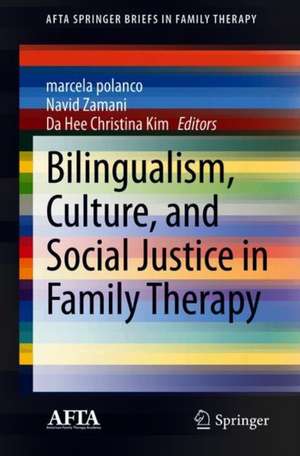Bilingualism, Culture, and Social Justice in Family Therapy: AFTA SpringerBriefs in Family Therapy
Editat de marcela polanco, Navid Zamani, Christina Da Hee Kimen Limba Engleză Paperback – 13 apr 2021
Preț: 477.34 lei
Nou
Puncte Express: 716
Preț estimativ în valută:
91.35€ • 94.83$ • 76.17£
91.35€ • 94.83$ • 76.17£
Carte tipărită la comandă
Livrare economică 22 martie-05 aprilie
Preluare comenzi: 021 569.72.76
Specificații
ISBN-13: 9783030660352
ISBN-10: 3030660354
Pagini: 96
Ilustrații: XV, 96 p. 2 illus.
Dimensiuni: 155 x 235 x 13 mm
Greutate: 0.17 kg
Ediția:1st ed. 2021
Editura: Springer International Publishing
Colecția Springer
Seria AFTA SpringerBriefs in Family Therapy
Locul publicării:Cham, Switzerland
ISBN-10: 3030660354
Pagini: 96
Ilustrații: XV, 96 p. 2 illus.
Dimensiuni: 155 x 235 x 13 mm
Greutate: 0.17 kg
Ediția:1st ed. 2021
Editura: Springer International Publishing
Colecția Springer
Seria AFTA SpringerBriefs in Family Therapy
Locul publicării:Cham, Switzerland
Cuprins
Chapter 1. Therapeutic Latinx Chismorreo.- Chapter 2. Doing Justice with Street Farsi.- Chapter 3. Intersections of Asian Languages, Culture, and Professional Education: Where the Personal and Professional Intimately Collide.- Chapter 4. First Language Recognition and Identities: An Italian perspective.- Chapter 5. Black Speak in Therapy.- Chapter 6. Working as a Team: Doing Therapy with Interpreters.- Chapter 7. Traversing Languages for Agency in the Practice of Trauma Work.- Chapter 8. Legitimizing Comadre Terapia: Postmodern Practices in the Linguistic and Cultural Borderlands.- Chapter 9. Linguistic identities of bilingual MFTs: Practicing across the borders of Spanish and English.- Chapter 10. The Road to Bilingual Supervision.- Chapter 11. Tejiendo Nuevos Horizontes Linguisticos/Weaving New Linguistic Horizons.
Notă biografică
marcela polanco, es de Bogotá, Colombia e inmigrante en United States. Su ancestry es African, Muisca, and European Colombian. She speaks Español Colombiano and Immigrant Spanglish. As a family terapista, she is part of the faculty team del Master’s en Family Therapy y del Spanglish/Ingleñol Family Therapy training Certificado at San Diego State University located in unceded Kumeyaay land.
Navid Zamani is a Persian-American (Farsi & English-speaking) licensed Marriage and Family therapist practicing in San Diego. His work is structured around supporting families experiencing domestic violence, and conceptualizes these experiences from a poststructural, decolonial feminism situated in Narrative practices. His interests in counseling, philosophy, and music are blended together with an interest in relational ethics, the politics of revolutionary love, and leaning into complexity. He currently teaches at San Diego State University and is the Head of Clinical Services at License to Freedom, a non-profit that supports refugees and immigrants from the Middle East who are experiencing domestic violence issues.
Christina DaHee Kim is a Korean immigrant who grew up in Los Angeles. She traverses between the worlds of English, Korean, and the mix of two languages, Konglish. Her interest in all forms of communication, including various languages and the non-verbal communication, stem from her exposure to Spanish-, Japanese-, and sign language-speaking worlds. As a recent graduate from the Marriage and Family Therapy program at San Diego State University, she hopes to collaborate and explore relational ethics in diverse relationship dynamics from a postmodern lens.
Navid Zamani is a Persian-American (Farsi & English-speaking) licensed Marriage and Family therapist practicing in San Diego. His work is structured around supporting families experiencing domestic violence, and conceptualizes these experiences from a poststructural, decolonial feminism situated in Narrative practices. His interests in counseling, philosophy, and music are blended together with an interest in relational ethics, the politics of revolutionary love, and leaning into complexity. He currently teaches at San Diego State University and is the Head of Clinical Services at License to Freedom, a non-profit that supports refugees and immigrants from the Middle East who are experiencing domestic violence issues.
Christina DaHee Kim is a Korean immigrant who grew up in Los Angeles. She traverses between the worlds of English, Korean, and the mix of two languages, Konglish. Her interest in all forms of communication, including various languages and the non-verbal communication, stem from her exposure to Spanish-, Japanese-, and sign language-speaking worlds. As a recent graduate from the Marriage and Family Therapy program at San Diego State University, she hopes to collaborate and explore relational ethics in diverse relationship dynamics from a postmodern lens.
Textul de pe ultima copertă
This volume advocates for justice in language rights through its explorations of bilingualism in family therapy, from the perspectives of eighteen languages identified by the authors: Black Talk/Ebonics/Slang, Farsi, Fenglish, Arabic, Italian, Cantonese Chinese, South Korean, Mandarin Chinese, Vietnamese, Spanish, Chilean Spanish, Mexican Spanish, Colombian Spanglish, Madrileño Spanish, Spanglish, Pocho Spanish, Colloquial Spanish, and English. It identifies standard English as the current language most often used across family therapy programs and services in the United States. The book discusses efforts to respond to the rapidly changing linguistic landscape and the increasingly high demand for appropriate therapy services that respond effectively to diverse families in America. It discusses recruitment and training of linguistically diverse family therapists and strategies to promote linguistic equality to support the rights of family therapists, their practices, and the communitiesthey serve. Chapters explore ways to integrate languages in professional and personal lives, including the improvisational, self-taught translanguaging skills and practices that go beyond the lexical and grammatical rules of a language. The book describes the creative use of native or heritage languages to ensure that the juxtaposition of English therapeutic and daily-life landscapes is integrated into family therapy settings. It discusses contextual, relational, therapeutic, and training potential offered by bilingualism as well as the necessary transmutations in theory and practice.This volume is an essential resource for clinicians, therapists, and practitioners as well as researchers, professors, and graduate students in family studies, clinical psychology, and public health as well as all interrelated disciplines.
Caracteristici
Advocates for social justice through explorations of bilingualism across family therapy settings Addresses the rapidly changing linguistic landscape and increasingly high demand for appropriate family therapy services Details strategies for responding to diverse families in therapy Discusses recruiting and training linguistically diverse family therapists and strategies to promote linguistic equality in family therapy
















